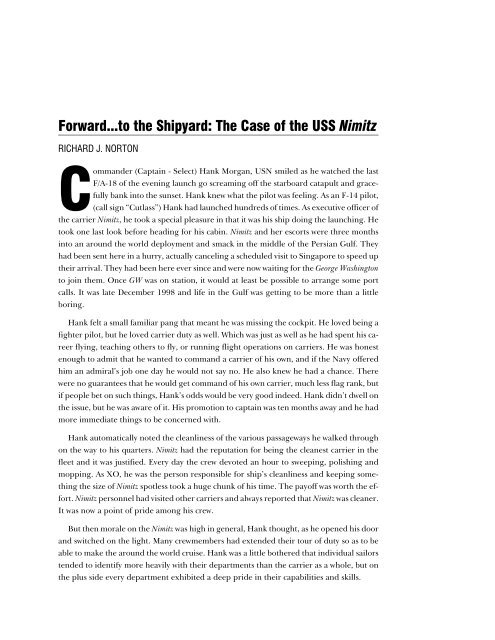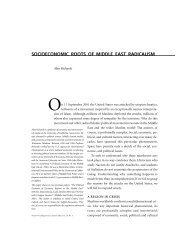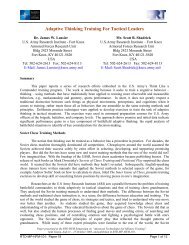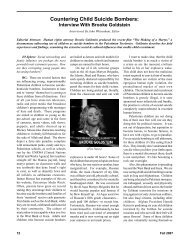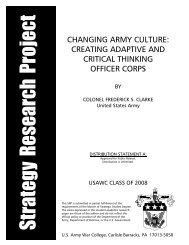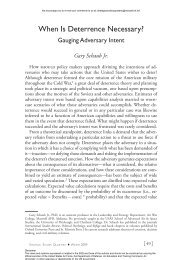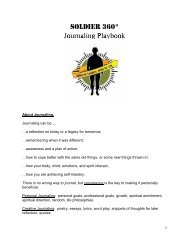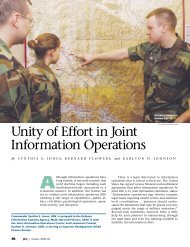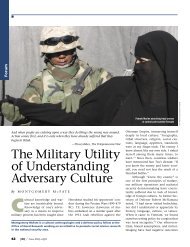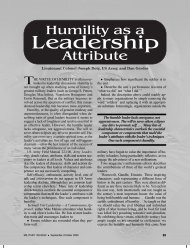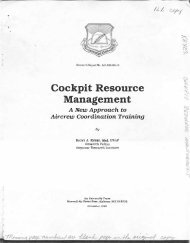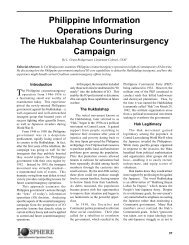Forward...to the Shipyard: The Case of the USS Nimitz
Forward...to the Shipyard: The Case of the USS Nimitz
Forward...to the Shipyard: The Case of the USS Nimitz
You also want an ePaper? Increase the reach of your titles
YUMPU automatically turns print PDFs into web optimized ePapers that Google loves.
<strong>Forward</strong>...<strong>to</strong> <strong>the</strong> <strong>Shipyard</strong>: <strong>The</strong> <strong>Case</strong> <strong>of</strong> <strong>the</strong> <strong>USS</strong> <strong>Nimitz</strong><br />
RICHARD J. NORTON<br />
Commander (Captain - Select) Hank Morgan, USN smiled as he watched <strong>the</strong> last<br />
F/A-18 <strong>of</strong> <strong>the</strong> evening launch go screaming <strong>of</strong>f <strong>the</strong> starboard catapult and gracefully<br />
bank in<strong>to</strong> <strong>the</strong> sunset. Hank knew what <strong>the</strong> pilot was feeling. As an F-14 pilot,<br />
(call sign “Cutlass”) Hank had launched hundreds <strong>of</strong> times. As executive <strong>of</strong>ficer <strong>of</strong><br />
<strong>the</strong> carrier <strong>Nimitz</strong>, he <strong>to</strong>ok a special pleasure in that it was his ship doing <strong>the</strong> launching. He<br />
<strong>to</strong>ok one last look before heading for his cabin. <strong>Nimitz</strong> and her escorts were three months<br />
in<strong>to</strong> an around <strong>the</strong> world deployment and smack in <strong>the</strong> middle <strong>of</strong> <strong>the</strong> Persian Gulf. <strong>The</strong>y<br />
had been sent here in a hurry, actually canceling a scheduled visit <strong>to</strong> Singapore <strong>to</strong> speed up<br />
<strong>the</strong>ir arrival. <strong>The</strong>y had been here ever since and were now waiting for <strong>the</strong> George Washing<strong>to</strong>n<br />
<strong>to</strong> join <strong>the</strong>m. Once GW was on station, it would at least be possible <strong>to</strong> arrange some port<br />
calls. It was late December 1998 and life in <strong>the</strong> Gulf was getting <strong>to</strong> be more than a little<br />
boring.<br />
Hank felt a small familiar pang that meant he was missing <strong>the</strong> cockpit. He loved being a<br />
fighter pilot, but he loved carrier duty as well. Which was just as well as he had spent his career<br />
flying, teaching o<strong>the</strong>rs <strong>to</strong> fly, or running flight operations on carriers. He was honest<br />
enough <strong>to</strong> admit that he wanted <strong>to</strong> command a carrier <strong>of</strong> his own, and if <strong>the</strong> Navy <strong>of</strong>fered<br />
him an admiral’s job one day he would not say no. He also knew he had a chance. <strong>The</strong>re<br />
were no guarantees that he would get command <strong>of</strong> his own carrier, much less flag rank, but<br />
if people bet on such things, Hank’s odds would be very good indeed. Hank didn’t dwell on<br />
<strong>the</strong> issue, but he was aware <strong>of</strong> it. His promotion <strong>to</strong> captain was ten months away and he had<br />
more immediate things <strong>to</strong> be concerned with.<br />
Hank au<strong>to</strong>matically noted <strong>the</strong> cleanliness <strong>of</strong> <strong>the</strong> various passageways he walked through<br />
on <strong>the</strong> way <strong>to</strong> his quarters. <strong>Nimitz</strong> had <strong>the</strong> reputation for being <strong>the</strong> cleanest carrier in <strong>the</strong><br />
fleet and it was justified. Every day <strong>the</strong> crew devoted an hour <strong>to</strong> sweeping, polishing and<br />
mopping. As XO, he was <strong>the</strong> person responsible for ship’s cleanliness and keeping something<br />
<strong>the</strong> size <strong>of</strong> <strong>Nimitz</strong> spotless <strong>to</strong>ok a huge chunk <strong>of</strong> his time. <strong>The</strong> pay<strong>of</strong>f was worth <strong>the</strong> effort.<br />
<strong>Nimitz</strong> personnel had visited o<strong>the</strong>r carriers and always reported that <strong>Nimitz</strong> was cleaner.<br />
It was now a point <strong>of</strong> pride among his crew.<br />
But <strong>the</strong>n morale on <strong>the</strong> <strong>Nimitz</strong> was high in general, Hank thought, as he opened his door<br />
and switched on <strong>the</strong> light. Many crewmembers had extended <strong>the</strong>ir <strong>to</strong>ur <strong>of</strong> duty so as <strong>to</strong> be<br />
able <strong>to</strong> make <strong>the</strong> around <strong>the</strong> world cruise. Hank was a little bo<strong>the</strong>red that individual sailors<br />
tended <strong>to</strong> identify more heavily with <strong>the</strong>ir departments than <strong>the</strong> carrier as a whole, but on<br />
<strong>the</strong> plus side every department exhibited a deep pride in <strong>the</strong>ir capabilities and skills.
224 <strong>Forward</strong>...<strong>to</strong> <strong>the</strong> <strong>Shipyard</strong>: <strong>The</strong> case <strong>of</strong> <strong>the</strong> <strong>USS</strong> <strong>Nimitz</strong><br />
When <strong>Nimitz</strong> had deployed in<strong>to</strong> <strong>the</strong> Persian Gulf, <strong>the</strong> chance <strong>of</strong> going in<strong>to</strong> combat had<br />
only increased morale. <strong>The</strong>re had been a real feeling <strong>of</strong> excitement in <strong>the</strong> Operations<br />
Department and <strong>the</strong> air wing as planning for potential strike operations got underway. But<br />
that had been a month or more ago. Morale was still good, but <strong>the</strong> crew was ready for a port<br />
call. After all <strong>the</strong> “hurry up” nature <strong>of</strong> <strong>the</strong>ir initial tasking, <strong>the</strong> time in <strong>the</strong> Gulf had been<br />
anti-climatic. At first combat operations seemed imminent. Now, things seemed more like a<br />
drill.<br />
<strong>Nimitz</strong> was a monster. Bigger than any o<strong>the</strong>r type <strong>of</strong> warship afloat, her crew consisted <strong>of</strong><br />
3,000 <strong>of</strong>ficers and men, assigned <strong>to</strong> sixteen departments. <strong>The</strong> air wing added an additional<br />
2,800 sailors and eight squadrons <strong>of</strong> various aircraft. Her job was power projection and<br />
Hank was sure no carrier did it better.<br />
Which was just as well. Rear Admiral Bonnet, commanding <strong>the</strong> <strong>Nimitz</strong> battle group, was a<br />
fierce opera<strong>to</strong>r and a natural warrior. In previous <strong>to</strong>urs he had been both <strong>Nimitz</strong>’s XO and<br />
CO. He still loved <strong>the</strong> ship and used it as his principal “prop” in entertaining distinguished<br />
visi<strong>to</strong>rs (DVs). Of those <strong>the</strong>re was no shortage, and it was Hank’s personal job <strong>to</strong> be sure<br />
those visits went <strong>of</strong>f without a hitch. <strong>The</strong> admiral and <strong>the</strong> CO had made that clear. Making it<br />
work <strong>to</strong>ok up a lot <strong>of</strong> his time as <strong>the</strong>re were always DVs coming or already aboard, but Hank<br />
felt <strong>the</strong> ship had it down <strong>to</strong> a science. If <strong>the</strong>re was going <strong>to</strong> be shooting, Bonnet would be in<br />
his element and certain <strong>to</strong> get as much DV presence on board as possible. At <strong>the</strong> present<br />
time <strong>the</strong>re were no DVs on <strong>Nimitz</strong>, which was good, for Hank needed <strong>the</strong> time <strong>to</strong> deal with<br />
representatives from both <strong>the</strong> Newport News shipyard and commander, Naval Air Forces<br />
Pacific (AirPac—a Pacific coast three star admiral who administratively “owned” every carrier<br />
and airplane homeported from California <strong>to</strong> Japan).<br />
<strong>The</strong> shipyard was <strong>the</strong> reason that <strong>Nimitz</strong> was sailing around <strong>the</strong> world and changing<br />
homeports from Bremer<strong>to</strong>n, Washing<strong>to</strong>n <strong>to</strong> Newport News, Virginia. Once in <strong>the</strong> Newport<br />
News shipyard, refueling and overhaul would begin. <strong>The</strong> process would take more than two<br />
years and would affect every aspect <strong>of</strong> shipboard life. Fur<strong>the</strong>rmore, AirPac was determined<br />
<strong>to</strong> see <strong>Nimitz</strong> return <strong>to</strong> <strong>the</strong> Pacific, swearing <strong>to</strong> avoid “<strong>the</strong> Enterprise disaster.” Enterprise had<br />
performed a similar port change and overhaul several years earlier. <strong>The</strong> overhaul went<br />
badly over cost and over time. As a result, convinced that <strong>the</strong> Enterprise overhaul had been<br />
badly mishandled, <strong>the</strong> CNO had directed AirLant (AirPac’s East Coast equivalent) <strong>to</strong> assume<br />
command <strong>of</strong> <strong>the</strong> ship in order <strong>to</strong> get it through <strong>the</strong> yards. He did and <strong>the</strong>n, once <strong>the</strong><br />
overhaul was finished, AirLant had kept <strong>the</strong> carrier. <strong>The</strong> “Big E” never returned <strong>to</strong> <strong>the</strong> West<br />
Coast. AirPac lost a major asset, had <strong>to</strong> rearrange carrier schedules and had <strong>to</strong> bear <strong>the</strong> embarrassment<br />
<strong>of</strong> having ano<strong>the</strong>r admiral fix “his” problem. <strong>The</strong> current AirPac had publicly<br />
sworn that such a thing was not going <strong>to</strong> happen again, especially as common wisdom held<br />
that Enterprise’s real problem had been a lack <strong>of</strong> advance planning. <strong>The</strong> AirPac representatives<br />
and <strong>the</strong> <strong>Shipyard</strong> people were pushing hard <strong>to</strong> start <strong>the</strong> planning process now.<br />
<strong>The</strong> reac<strong>to</strong>r <strong>of</strong>ficer (<strong>The</strong> CVN equivalent <strong>of</strong> <strong>the</strong> “chief engineer,” <strong>the</strong> senior ranking <strong>of</strong>ficer<br />
in <strong>the</strong> Engineering Department.) and <strong>the</strong> engineer <strong>of</strong>ficer (<strong>the</strong> reac<strong>to</strong>r <strong>of</strong>ficer’s principal<br />
assistant for non-nuclear engineering equipment, spaces, and so on) joined <strong>the</strong>m in this
Nor<strong>to</strong>n 225<br />
recommendation. <strong>The</strong> two <strong>of</strong> <strong>the</strong>m had been pushing <strong>the</strong> XO about this for weeks. Captain<br />
John Rackham, <strong>the</strong> reac<strong>to</strong>r <strong>of</strong>ficer, was a senior 0-6 surface nuke, as senior as Captain<br />
Wynne, <strong>Nimitz</strong>’s CO and much more senior than Hank. Rackham had held 0-5 command at<br />
sea, served as a reac<strong>to</strong>r <strong>of</strong>ficer on a different carrier and had voluntarily returned for a second<br />
<strong>to</strong>ur when he failed <strong>to</strong> screen for major command. He ruled his department as if it were<br />
his kingdom. His junior <strong>of</strong>ficers feared his volatile temper as much or more than <strong>the</strong>y respected<br />
his engineering knowledge. Commander Charles Vane, <strong>the</strong> engineer <strong>of</strong>ficer, had<br />
served in nothing but engineering billets since he was a junior lieutenant and knew his stuff.<br />
He and <strong>the</strong> reac<strong>to</strong>r <strong>of</strong>ficer were natural allies, with little concern about <strong>the</strong> rest <strong>of</strong> <strong>the</strong> departments<br />
on <strong>the</strong> ship. That had been painfully obvious in Hong Kong.<br />
In Hong Kong, although most <strong>of</strong> <strong>the</strong> ship’s company had gone between <strong>the</strong> ship and <strong>the</strong><br />
shore by using various commercial ferries and water taxis, <strong>the</strong> CO and <strong>the</strong> admiral had relied<br />
on <strong>the</strong>ir gig and barge (as <strong>the</strong>ir personal small boats are called). Luckily, <strong>the</strong> barge had<br />
worked fine, but on <strong>the</strong> first trip <strong>the</strong> gig broke down, stranding a very angry captain in <strong>the</strong><br />
middle <strong>of</strong> <strong>the</strong> harbor. Commander Vane and Lieutenant Commander Bart Roberts, <strong>the</strong><br />
<strong>Nimitz</strong>‘ First Lieutenant, who was in charge <strong>of</strong> <strong>the</strong> Deck Department had each immediately<br />
blamed <strong>the</strong> o<strong>the</strong>r’s department for <strong>the</strong> breakdown. According <strong>to</strong> Roberts <strong>the</strong> engineers<br />
never gave proper attention <strong>to</strong> <strong>the</strong> boat engines. Vane had shot back that <strong>the</strong> Deck Department<br />
sailors simply did not know what <strong>the</strong>y were doing and broke <strong>the</strong> boat. <strong>The</strong> wrath <strong>of</strong> <strong>the</strong><br />
CO ensured that <strong>the</strong> repairs were quickly made, but <strong>the</strong> argument continued. Hank also<br />
knew <strong>the</strong> fix was temporary. <strong>The</strong> boat might work, but <strong>the</strong> cooperation was still broken. If<br />
<strong>the</strong>y were this antagonistic now, Hank wondered, what would <strong>the</strong>y be like in <strong>the</strong> shipyard?<br />
<strong>The</strong> issue with <strong>the</strong> boats was but one <strong>of</strong> a dozen or more arguments relating <strong>to</strong> turf. All<br />
<strong>the</strong> departments were ferociously protective <strong>of</strong> <strong>the</strong>ir areas <strong>of</strong> responsibility and quick <strong>to</strong> perceive<br />
encroachment on “<strong>the</strong>ir” terrain. <strong>The</strong> most recent battle had occurred when <strong>the</strong> Information<br />
Department had become involved with <strong>the</strong> Combat Systems Department in a ra<strong>the</strong>r<br />
nasty fight over an electronics lab. Hank had ruled in favor <strong>of</strong> Combat Systems. <strong>The</strong> <strong>Nimitz</strong>’s<br />
combat systems <strong>of</strong>ficer was CDR Anne Bonny, who was also <strong>the</strong> ship’s first woman department<br />
head. But that had nothing <strong>to</strong> do with why her department got <strong>the</strong> lab space. <strong>The</strong> Information<br />
Department didn’t need it and Combat Systems did.<br />
Hank thought that gender integration seemed <strong>to</strong> be working. In addition <strong>to</strong> Bonny,<br />
three o<strong>the</strong>r department heads were women, as were at least six hundred <strong>of</strong> <strong>the</strong> crew. While<br />
<strong>the</strong>re had been some disciplinary infractions, <strong>the</strong>y had not been <strong>to</strong>o serious. Punishment<br />
had been swift and consistent. Sure <strong>the</strong>re was still <strong>the</strong> rare complaint about minor things<br />
like a swimsuit calendar but <strong>the</strong>se were easily dealt with. O<strong>the</strong>r than Lieutenant Commander<br />
Mary Read, <strong>the</strong> second senior chaplain, no one seemed <strong>to</strong> have any problems with<br />
<strong>the</strong> change. If you listened <strong>to</strong> her, <strong>the</strong> chaplain corps discriminated against women, sexism<br />
was rampant on <strong>Nimitz</strong> and <strong>the</strong> CO was sitting on a time bomb. <strong>The</strong> o<strong>the</strong>r two chaplains,<br />
both men, disagreed.<br />
Ano<strong>the</strong>r thorny problem was that four <strong>of</strong> <strong>the</strong> department heads (Hank thought <strong>of</strong> <strong>the</strong>m<br />
as “<strong>the</strong> barons”) on <strong>Nimitz</strong> were senior <strong>to</strong> Hank. Although Hank tried <strong>to</strong> act as though this
226 <strong>Forward</strong>...<strong>to</strong> <strong>the</strong> <strong>Shipyard</strong>: <strong>The</strong> case <strong>of</strong> <strong>the</strong> <strong>USS</strong> <strong>Nimitz</strong><br />
didn’t make a difference, it did. <strong>The</strong>y and several o<strong>the</strong>rs had already completed an XO<br />
<strong>to</strong>ur. <strong>The</strong>y were never openly disrespectful or dismissive, but it was clear <strong>the</strong>y were not as<br />
impressed by his position as more junior department heads were. And each <strong>of</strong> <strong>the</strong>m had no<br />
problem seeing <strong>the</strong> CO anytime <strong>the</strong>y wanted without going through him.<br />
But <strong>the</strong> biggest problem that Hank saw was <strong>the</strong> upcoming yard period and all it’s associated<br />
hassles. Some <strong>of</strong> <strong>the</strong>se were going <strong>to</strong> involve personnel. Some sailors had left <strong>the</strong>ir families<br />
in Washing<strong>to</strong>n state, intending <strong>to</strong> move after <strong>the</strong> cruise was over. O<strong>the</strong>r families had<br />
moved <strong>to</strong> <strong>the</strong> Norfolk area as soon as <strong>Nimitz</strong> pulled away from <strong>the</strong> pier. Some were already<br />
experiencing financial problems or domestic difficulties. Hank had just received an E-mail<br />
from his wife Kelly that morning. She reported that <strong>Nimitz</strong>‘s family problems were on <strong>the</strong><br />
rise. Having a husband—no, a spouse—he corrected himself, gone on deployment was always<br />
<strong>to</strong>ugh. When you added <strong>the</strong> burden <strong>of</strong> trying <strong>to</strong> manage a coast <strong>to</strong> coast move it got<br />
worse.<br />
Ano<strong>the</strong>r yard-related problem was that a large number <strong>of</strong> sailors were going <strong>to</strong> be leaving<br />
<strong>Nimitz</strong> for good within three months <strong>of</strong> finishing <strong>the</strong> cruise. Losing a number <strong>of</strong> sailors was<br />
not unusual for most ships entering <strong>the</strong> yard, but it would be much worse for <strong>Nimitz</strong>, asso<br />
many <strong>of</strong> her crew had extended <strong>the</strong>ir <strong>to</strong>urs <strong>of</strong> duty <strong>to</strong> make <strong>the</strong> big cruise. Shipwide, <strong>the</strong> loss<br />
would exceed 30% and in some departments it would be much higher. <strong>The</strong> Navy was not<br />
likely <strong>to</strong> put <strong>the</strong> ship’s manpower needs at <strong>the</strong> <strong>to</strong>p <strong>of</strong> <strong>the</strong> priority list until near <strong>the</strong> end <strong>of</strong><br />
<strong>the</strong> yard period. By <strong>the</strong> time <strong>Nimitz</strong> was back at sea, , probably about two years after entering<br />
<strong>the</strong> shipyard, Hank’s relief would be lucky if 10% <strong>of</strong> <strong>the</strong> crew had been aboard for one day<br />
underway.<br />
Once in Virginia <strong>the</strong> remaining crew would rapidly be scattered all over <strong>the</strong> Newport<br />
News area. Due <strong>to</strong> all <strong>the</strong> repairs, <strong>the</strong> ship would be uninhabitable and a lot <strong>of</strong> <strong>the</strong> work<br />
would be done in shops, labs and <strong>of</strong>fices that were miles apart. <strong>Nimitz</strong> was going <strong>to</strong> have <strong>to</strong><br />
maintain eight geographically separated installations, not counting <strong>the</strong> married housing<br />
areas and <strong>the</strong> quarters for <strong>the</strong> more than two thousand sailors who usually lived aboard <strong>the</strong><br />
ship all <strong>the</strong> time. If <strong>the</strong>y weren’t careful some <strong>Nimitz</strong> sailors might go months without stepping<br />
foot on <strong>the</strong> ship. Maintaining crew unity was going <strong>to</strong> be more than a little challenging.<br />
It would be worst for <strong>the</strong> young sailors reporting from boot camp. Keen, eager and terribly<br />
green, <strong>the</strong>y would be looking for travel and adventure. <strong>The</strong>y would find an industrial work<br />
site dominated by noise, dirt and civilians. <strong>The</strong>ir ship, <strong>the</strong> pride <strong>of</strong> <strong>the</strong> Navy’s striking<br />
forces, would be a stifling steel box, with massive access holes cut in<strong>to</strong> its decks and sides. It<br />
was about as far away from <strong>the</strong> recruiting poster image as you could get.<br />
<strong>The</strong> results were predictable. Most ships in this environment discovered that discipline<br />
incidents ranging from drug usage <strong>to</strong> <strong>the</strong>ft <strong>to</strong> spouse abuse rose. Morale fell. Crew cohesion<br />
was <strong>of</strong>ten strained past <strong>the</strong> breaking point. Relations between <strong>the</strong> shipyard workers and<br />
ship’s force personnel required constant attention and care. Usually <strong>the</strong>se problems intensified<br />
as a ship entered <strong>the</strong> second half <strong>of</strong> a shipyard stay. <strong>The</strong> pressure <strong>of</strong> <strong>the</strong> schedule, <strong>the</strong><br />
requirement <strong>to</strong> test re-installed and new equipment, while at <strong>the</strong> same time re-s<strong>to</strong>cking <strong>the</strong><br />
ship and preparing for sea, strained tempers <strong>to</strong> <strong>the</strong> utmost. In some cases delays in meeting
Nor<strong>to</strong>n 227<br />
deadlines had resulted in legal action. Such pressure <strong>of</strong>ten led supervisors <strong>to</strong> misreport <strong>the</strong><br />
status <strong>of</strong> <strong>the</strong>ir jobs and <strong>to</strong> cut corners in a variety <strong>of</strong> ways. Everyone swore that without good<br />
planning, <strong>Nimitz</strong> was going <strong>to</strong> be a bigger debacle than <strong>the</strong> Enterprise. Hank grimaced. Nuclear<br />
overhauls were planned years in advance, required tremendous allocations <strong>of</strong> budget<br />
and personnel resources and <strong>the</strong>ir associated miles<strong>to</strong>ne dates were cast in s<strong>to</strong>ne. Some <strong>of</strong><br />
<strong>the</strong> work on <strong>Nimitz</strong> would require months <strong>of</strong> lead-time.<br />
It was true that <strong>the</strong>re were already numerous plans, plans put <strong>to</strong>ge<strong>the</strong>r by many <strong>of</strong> <strong>the</strong><br />
shipyard shops and some specialized overhaul teams, but <strong>the</strong>se had <strong>to</strong> be integrated by <strong>the</strong><br />
ship. In addition, <strong>Nimitz</strong> was going <strong>to</strong> have <strong>to</strong> be completely <strong>of</strong>f-loaded in only 60 days after<br />
<strong>the</strong> traditional 30-day post-deployment stand-down period. Every piece <strong>of</strong> furniture, every<br />
spare part and technical manual—in short everything that wasn’t welded down was going <strong>to</strong><br />
have <strong>to</strong> come <strong>of</strong>f <strong>the</strong> ship. Sixty days should be enough time—if <strong>the</strong> <strong>of</strong>f-load was properly<br />
planned. But if planning <strong>the</strong> <strong>of</strong>f-load didn’t start soon, <strong>the</strong> <strong>of</strong>f-load wasn’t going <strong>to</strong> work. If<br />
<strong>the</strong> <strong>of</strong>f-load didn’t work, o<strong>the</strong>r time-lines would slip. <strong>The</strong> domino effect could wreck any<br />
master plan before <strong>the</strong> work ever really got started.<br />
Hank found a blank page <strong>of</strong> his notebook and drew a visual representation <strong>of</strong> his “overhaul”<br />
problem." (See Appendix One) It seemed simple. <strong>The</strong> challenge was <strong>to</strong> take <strong>Nimitz</strong><br />
from <strong>the</strong> pinnacle <strong>of</strong> operational readiness, turn it in<strong>to</strong> a repair facility, get good at being a<br />
repair facility, and <strong>the</strong>n two years from now, turn it in<strong>to</strong> an operational warship again. <strong>The</strong><br />
problem was that <strong>the</strong> operational and repair environments were completely different from<br />
one ano<strong>the</strong>r.<br />
Hank had brought <strong>the</strong> matter up with <strong>the</strong> CO earlier that morning. He was surprised by<br />
<strong>the</strong> CO’s reaction. “XO, what are you thinking? This is no time <strong>to</strong> get <strong>the</strong> crew looking at<br />
shipyard issues. We’ve been in <strong>the</strong> Gulf for fifty-six days straight. We’ve gone through two<br />
false alarms where we’ve been ready <strong>to</strong> launch and <strong>the</strong>n been s<strong>to</strong>od down. I’m really worried<br />
about complacency. You get people thinking about Norfolk, and you’ll just increase <strong>the</strong><br />
chance that someone will get sloppy and maybe killed!”<br />
Hank tried <strong>to</strong> explain about <strong>the</strong> potential long-term impact if <strong>the</strong> shipyard preparations<br />
were delayed <strong>to</strong>o long, but <strong>the</strong> CO cut him <strong>of</strong>f. “Look Hank, I understand why you’re worried<br />
and that you’re trying <strong>to</strong> do your job <strong>to</strong> your usual high standard. But, I’ve got a weapons<br />
system <strong>to</strong> run. Going in<strong>to</strong> <strong>the</strong> shipyard is like being tied <strong>to</strong> a train track with a<br />
locomotive coming at you. It’s going <strong>to</strong> run you over. You can’t plan that away. I know. Remember,<br />
I was Enterprise’s XO. We did all <strong>the</strong> planning and held all <strong>the</strong> meetings and in <strong>the</strong><br />
end, it was still a nightmare. So, let’s focus on what we can control — keeping <strong>the</strong> crew ready<br />
<strong>to</strong> take ano<strong>the</strong>r poke at Saddam Hussein.” As Hank rose <strong>to</strong> leave, Captain Wynne motioned<br />
him back down in his seat. Frowning, he began talking. “Hold on XO. I know you’ve got a<br />
point.” He paused for a moment, obviously struggling with himself. “Okay, here’s what we’ll<br />
do. You take care <strong>of</strong> <strong>the</strong> yard preparations. After we leave <strong>the</strong> Gulf, whenever that is, I’ll<br />
probably have time <strong>to</strong> get more involved. But while we’re here I can’t give <strong>the</strong> shipyard my<br />
personal attention. So you do it. Keep my involvement <strong>to</strong> <strong>the</strong> absolute minimum."
228 <strong>Forward</strong>...<strong>to</strong> <strong>the</strong> <strong>Shipyard</strong>: <strong>The</strong> case <strong>of</strong> <strong>the</strong> <strong>USS</strong> <strong>Nimitz</strong><br />
Hank sighed as he headed away from <strong>the</strong> meeting. He and Captain Wynne had a good<br />
relationship. Wynne had begun his career in an ancient fighter called <strong>the</strong> F-8. He had<br />
transitioned <strong>to</strong> F-4s when <strong>the</strong> F-8 was removed from service. He had gone nuke, served as<br />
XO in Enterprise, had command <strong>of</strong> a large surface ship, been a senior branch chief in <strong>the</strong><br />
Pentagon and now had <strong>Nimitz</strong>. Hank knew <strong>the</strong> CO was pleased with <strong>Nimitz</strong> and with him, although<br />
Hank had been required <strong>to</strong> find that out for himself. When he reported <strong>to</strong> <strong>Nimitz</strong><br />
Hank had expected <strong>to</strong> spend some time discussing command philosophy with <strong>the</strong> CO, but<br />
<strong>the</strong> only guidance <strong>the</strong> boss gave him was short and <strong>to</strong> <strong>the</strong> point. “You keep things running,<br />
you let me keep focused on making <strong>Nimitz</strong> <strong>the</strong> lethal machine she is. Morale is high, <strong>the</strong> ship<br />
is clean and we have a great deployment schedule. <strong>The</strong> admiral loves us and so does AirPac.<br />
If anything changes, I’ll let you know.”<br />
<strong>The</strong> CO communicated with <strong>the</strong> crew in a variety <strong>of</strong> ways. When it came <strong>to</strong> policy he used<br />
“CO-Memos.” <strong>The</strong>se were consecutively numbered and dealt with ship-wide issues.<br />
CO-Memo One explained what he wanted from <strong>the</strong> ship. <strong>Nimitz</strong> was going <strong>to</strong> be known for<br />
honesty and integrity, a <strong>to</strong>tal lack <strong>of</strong> double standards, and <strong>the</strong> highest levels <strong>of</strong> cleanliness.<br />
<strong>Nimitz</strong> was going <strong>to</strong> be <strong>the</strong> standard by which all carriers would be measured. Based on<br />
Hank’s interaction with <strong>the</strong> ship’s crew, he felt pretty sure <strong>the</strong> sailors unders<strong>to</strong>od <strong>the</strong> CO’s<br />
views. Although his schedule was tight, <strong>the</strong> CO routinely managed <strong>to</strong> visit most <strong>of</strong> <strong>the</strong> main<br />
areas <strong>of</strong> <strong>the</strong> ship in person every so <strong>of</strong>ten.<br />
<strong>The</strong> families at home were also kept informed. <strong>Nimitz</strong> had e-mail and a web page<br />
Hank knew <strong>the</strong> change <strong>of</strong> homeport would have been much more difficult without <strong>the</strong><br />
web page. Keeping <strong>the</strong> families plugged in was ano<strong>the</strong>r way <strong>the</strong> Navy had changed. <strong>The</strong> CO<br />
liked <strong>the</strong> web page and used it <strong>to</strong> communicate with <strong>the</strong> families. Unfortunately that meant<br />
<strong>the</strong> families used it <strong>to</strong> communicate with him. He directed that every message he received<br />
had <strong>to</strong> be answered. <strong>The</strong> administrative <strong>of</strong>ficer was in charge <strong>of</strong> that job, but Hank was responsible<br />
for making sure it was done right.<br />
But that wasn’t so bad. Hank was comfortable with <strong>the</strong> ship’s routine. <strong>The</strong> admiral was<br />
delighted with his flagship and <strong>the</strong> CO gave Hank a lot <strong>of</strong> room <strong>to</strong> do his job. Wynne was,<br />
however, inclined <strong>to</strong> jump in<strong>to</strong> things at times, so much so that Hank had learned <strong>to</strong> be<br />
careful in discussing personnel and o<strong>the</strong>r matters, least <strong>the</strong> CO go charging <strong>of</strong>f at full tilt.<br />
Hank never hid anything from <strong>the</strong> boss, but he did take some care in how information was<br />
presented. If Wynne had a weak area it was that, in Hank’s opinion, he was prone <strong>to</strong> let <strong>the</strong><br />
senior department heads cut <strong>the</strong> XO out <strong>of</strong> <strong>the</strong> loop at times. <strong>The</strong> reac<strong>to</strong>r <strong>of</strong>ficer was <strong>the</strong><br />
worst <strong>of</strong>fender, but <strong>the</strong> ops and air boss were also guilty. When Hank called <strong>the</strong>m on it,<br />
<strong>the</strong>re would be apologies, assurances that it wasn’t on purpose and a brief period <strong>of</strong> improvement,<br />
followed by a return <strong>to</strong> <strong>the</strong> old way <strong>of</strong> doing business — unless <strong>the</strong> CO was in a<br />
bad temper. <strong>The</strong>n <strong>the</strong> ‘barons" suddenly remembered <strong>the</strong>re was a chain <strong>of</strong> command. (See<br />
Appendix 2)<br />
Coming back <strong>to</strong> <strong>the</strong> question <strong>of</strong> <strong>the</strong> shipyard, Hank was still puzzled. Wynne was said <strong>to</strong><br />
be up for selection <strong>to</strong> flag rank. Hank knew <strong>the</strong> flag board was going <strong>to</strong> be held during <strong>the</strong>
Nor<strong>to</strong>n 229<br />
first half <strong>of</strong> <strong>Nimitz</strong>’s overhaul, so if things went really sour Wynne’s chances for promotion<br />
would be hurt. <strong>The</strong> CO was currently scheduled <strong>to</strong> be onboard at least a year after reaching<br />
Norfolk, so he wasn’t foisting <strong>of</strong>f future problems on <strong>the</strong> next guy.. Hank wondered if<br />
Wynne thought his promotion was a sure thing, and thus didn’t have <strong>to</strong> worry about <strong>the</strong><br />
overhaul. If he did believe that, whe<strong>the</strong>r it was true or false, it could complicate things.<br />
Hank thought about <strong>the</strong> engineers. Captain Rackham was a pain, but for all his abrasive<br />
nature, he had consistently made telling point after telling point at <strong>the</strong>ir most recent meeting<br />
with AirPac’s people. “XO, if we don’t get a handle on this now, we will never be able <strong>to</strong><br />
deconflict shipyard work from ship’s force work. That means we’ll have high-paid contrac<strong>to</strong>rs<br />
sitting around doing nothing, or our troops will have <strong>to</strong> work nights and weekends <strong>to</strong><br />
get our stuff done. <strong>The</strong>re’s also no way we’ll be able <strong>to</strong> intelligently manage people going on<br />
leave and <strong>to</strong> school. You’ve got <strong>to</strong> get <strong>the</strong> CO looking at this. I don’t care if he hates <strong>the</strong> shipyard.”<br />
<strong>The</strong> AirPac rep chimed in, “ I’d hate <strong>to</strong> have <strong>to</strong> report back that what happened <strong>to</strong><br />
Enterprise is likely <strong>to</strong> happen <strong>to</strong> <strong>Nimitz</strong>.” Hank recognized <strong>the</strong> implications <strong>of</strong> that statement.<br />
And, he admitted, Rackham’s point was valid.<br />
Hank also knew <strong>the</strong> CO had a valid point about focus. <strong>The</strong>re was every chance <strong>of</strong> prolonged<br />
Persian Gulf operations—and possibly even <strong>of</strong> combat. Hank knew that if <strong>the</strong>re was<br />
going <strong>to</strong> be shooting <strong>Nimitz</strong> was going <strong>to</strong> shine. But <strong>the</strong>re was no guarantee that <strong>the</strong>re would<br />
be shooting, and <strong>the</strong> way things were going it didn’t look like <strong>the</strong>re would be. He remembered<br />
similar deployments after <strong>the</strong> fall <strong>of</strong> <strong>the</strong> Shah. Carriers had spent months planning<br />
strikes, preparing <strong>to</strong> fight and maintaining a high level <strong>of</strong> combat readiness. In one cruise,<br />
Hank had been in his plane, on <strong>the</strong> catapult, ready <strong>to</strong> fly a combat operation no less than<br />
twelve times. Each time <strong>the</strong> mission had been scrubbed. That could happen again. Still, if<br />
<strong>the</strong>re was a chance <strong>of</strong> combat, didn’t he owe <strong>the</strong> ship, <strong>the</strong> crew, <strong>the</strong> CO, even <strong>the</strong> country,<br />
one hundred percent <strong>of</strong> his attention on fighting <strong>the</strong> ship? <strong>The</strong> current high-pitched Navy<br />
OPTEMPO was taking a <strong>to</strong>ll on <strong>the</strong> carriers. <strong>The</strong>re never seemed <strong>to</strong> be enough <strong>of</strong> <strong>the</strong>m <strong>to</strong><br />
meet demand. <strong>The</strong> result was a dramatic need for increased flexibility and responsiveness.<br />
It was surprising in some ways. Hank didn’t remember things ever being so unsettled, even<br />
during <strong>the</strong> Cold War. Wasn’t <strong>the</strong> CO simply focusing on <strong>the</strong> mission? Not that such an argument<br />
would carry any water with <strong>the</strong> powers that be if <strong>Nimitz</strong> wasn’t ready for <strong>the</strong> shipyard.<br />
<strong>The</strong> refueling and repair dates were simply not going <strong>to</strong> slip. As <strong>the</strong> first <strong>of</strong> her class <strong>to</strong> be<br />
refueled, <strong>Nimitz</strong> was going <strong>to</strong> be blazing an important pathway. It was also plain that AirPac<br />
wanted his favorite carrier back as fast as he could get it. Delay at this end could lead <strong>to</strong> huge<br />
problems on <strong>the</strong> o<strong>the</strong>r side <strong>of</strong> <strong>the</strong> Atlantic. And a carrier held over in <strong>the</strong> shipyard was a<br />
long way away from being a national asset. <strong>The</strong> engineers kept making that point <strong>to</strong>o.<br />
Unlike <strong>the</strong> reac<strong>to</strong>r <strong>of</strong>ficer, <strong>the</strong> o<strong>the</strong>r department heads were focused on <strong>the</strong> present. A<br />
few <strong>of</strong> <strong>the</strong>m did not have previous shipboard operational <strong>to</strong>urs and that was a problem at<br />
times. For instance, <strong>the</strong> CO wasn’t entirely sure he could rely on <strong>the</strong> combat systems <strong>of</strong>ficer<br />
(CSO) if it came <strong>to</strong> war. He <strong>to</strong>ld Hank that it was nothing personal, but Commander Bonny<br />
was a naval flight <strong>of</strong>ficer (NFO) who had commanded a recruiting district. On a cruiser, <strong>the</strong><br />
CSO would be a master tactician, and given <strong>the</strong> tumultuous 90s, likely <strong>to</strong> have combat
230 <strong>Forward</strong>...<strong>to</strong> <strong>the</strong> <strong>Shipyard</strong>: <strong>The</strong> case <strong>of</strong> <strong>the</strong> <strong>USS</strong> <strong>Nimitz</strong><br />
experience. That was <strong>the</strong> type <strong>of</strong> CSO Wynne wanted, but one that was an avia<strong>to</strong>r <strong>of</strong> course.<br />
Commander Bonny was clearly a competent and committed <strong>of</strong>ficer, but she and <strong>the</strong> Air Intermediate<br />
Maintenance Department (AIMD handles aircraft repair) <strong>of</strong>ficer were operational<br />
“unknowns.” It wasn’t such a big deal with <strong>the</strong> AIMD boss. His job was <strong>to</strong> fix things -<br />
and while combat would increase his stress levels, it wasn’t going <strong>to</strong> change <strong>the</strong> nature <strong>of</strong> his<br />
existence. <strong>The</strong> same might not be true for Combat Systems. Hank was absolutely sure <strong>the</strong><br />
CSO would be fine but he would continue <strong>to</strong> unobtrusively pay extra attention <strong>to</strong> <strong>the</strong> combat<br />
systems department. It was ano<strong>the</strong>r chunk <strong>of</strong> his time taken away, but it had <strong>to</strong> be done.<br />
<strong>The</strong>re was never enough time. Hank delegated everything he could, but <strong>the</strong>re was still a<br />
great deal left over. He had <strong>to</strong> spend a certain amount <strong>of</strong> time both formally and informally<br />
inspecting <strong>the</strong> ship—or at least parts <strong>of</strong> it—every day. He had <strong>to</strong> handle most disciplinary<br />
matters and de-brief all <strong>of</strong>ficer fitness reports. Some COs kept that job <strong>to</strong> <strong>the</strong>mselves, but<br />
Wynne had gladly handed this <strong>to</strong> Hank. <strong>The</strong>re were daily department head meetings,<br />
berthing and messing inspections, eight o’clock reports, zone inspections, material reports,<br />
classified material handling issues, damage control, battle and engineering drills <strong>to</strong> coordinate,<br />
a slew <strong>of</strong> watch standing and functional qualification boards <strong>to</strong> oversee, preventive<br />
maintenance programs, weekly planning meeting and a host <strong>of</strong> o<strong>the</strong>r jobs he was required—usually<br />
by instruction or even law—<strong>to</strong> do. If <strong>the</strong> CO had been fully active in shipyard<br />
preparations, Hank still would have had a major increase in workload. Without <strong>the</strong><br />
CO, <strong>the</strong>re was no way <strong>to</strong> guess how much more time he was going <strong>to</strong> have <strong>to</strong> commit. And,<br />
Hank admitted <strong>to</strong> himself, <strong>the</strong> demands <strong>of</strong> <strong>the</strong> day were eating him alive as it was.<br />
If <strong>the</strong> captain wasn’t focused on <strong>the</strong> shipyard, <strong>the</strong> command master chief was. Master Aviation<br />
Boatswains Mate Chief Kidd was a 28-year Navy veteran and <strong>the</strong> undisputed lord <strong>of</strong><br />
<strong>the</strong> Chief’s Mess. He had invited Hank <strong>to</strong> <strong>the</strong> Chief’s Mess for a cup <strong>of</strong> c<strong>of</strong>fee after lunch.<br />
“XO, <strong>the</strong> master chiefs and I have been talking about <strong>the</strong> yards.” Hank nodded. “We think<br />
<strong>the</strong> ship can go <strong>to</strong> eight section duty once we’re home—at least until we’re half-way through<br />
<strong>the</strong> yard period when <strong>the</strong> workload will increase.” Hank’s eyes widened. A portion <strong>of</strong> <strong>the</strong><br />
ship’s crew was always aboard in port, twenty-four hours a day, usually in four watch sections.<br />
Usually that meant most sailors—even those with families who lived <strong>of</strong>f <strong>the</strong><br />
ship—were spending one <strong>of</strong> every four days onboard <strong>the</strong> ship for twenty four hours straight<br />
when in home port. In most ships getting <strong>to</strong> five sections was a major achievement. “Wow.<br />
How do we manage that?” <strong>The</strong> master chief pulled out a Palm Pilot and consulted some<br />
notes. “Well, <strong>the</strong> first thing we do is make sure that <strong>the</strong>re is a really aggressive qualification<br />
program so that we have <strong>the</strong> numbers <strong>of</strong> trained people we need. <strong>The</strong> Training Department<br />
thinks <strong>the</strong>y can make that happen if everybody cooperates. <strong>The</strong>n, we need <strong>to</strong> scour <strong>the</strong> ship<br />
<strong>to</strong> make sure everyone is assigned <strong>to</strong> a watch section. I’m going <strong>to</strong> need your help with that,<br />
because we’re going <strong>to</strong> have <strong>to</strong> go after all <strong>the</strong> ”sacred cows" who claim <strong>the</strong>y don’t or can’t<br />
stand watch in port. That means <strong>the</strong> doc<strong>to</strong>rs and <strong>the</strong> dentists, <strong>the</strong> chaplain’s assistants, <strong>the</strong><br />
supply types, in short everyone." Hank thought about it and slowly asked, “Will those departments<br />
go along with <strong>the</strong> idea?” “Only if we force <strong>the</strong>m. But I think we can. Once we do,<br />
<strong>the</strong> quality <strong>of</strong> life for <strong>the</strong> crew will get better.” Hank promised he would sincerely think<br />
about it. If <strong>the</strong> master chief was willing <strong>to</strong> push hard on this idea, it could probably be made
Nor<strong>to</strong>n 231<br />
<strong>to</strong> work. But Hank wasn’t sure if <strong>the</strong> idea was good or not. For one thing, he thought it<br />
would fur<strong>the</strong>r decrease <strong>the</strong> sense <strong>of</strong> command unity when in <strong>the</strong> shipyard. But eight sections<br />
would be wildly popular with <strong>the</strong> crew and <strong>the</strong>ir families. He resolved <strong>to</strong> discuss it fur<strong>the</strong>r<br />
with <strong>the</strong> master chief.<br />
<strong>The</strong> phone rang and Hank answered. It was <strong>the</strong> supply <strong>of</strong>ficer. Captain Worley was a perpetually<br />
optimistic man who thought <strong>Nimitz</strong> was more like a family than any ship he had<br />
seen. Hank teased him about wearing rose colored glasses, but unders<strong>to</strong>od <strong>the</strong> supply<br />
<strong>of</strong>ficer’s point <strong>of</strong> view. First, Worley really was an optimist. He was almost unnaturally cheerful.<br />
Second, he saw himself as a resource provider and <strong>the</strong> o<strong>the</strong>r departments as cus<strong>to</strong>mers.<br />
He had trained his department <strong>to</strong> act <strong>the</strong> same way and <strong>the</strong> response from <strong>the</strong> rest <strong>of</strong> <strong>the</strong><br />
ship was positive. Finally, <strong>the</strong> department heads needed <strong>to</strong> be on <strong>the</strong> good side <strong>of</strong> <strong>the</strong> supply<br />
<strong>of</strong>ficer and <strong>to</strong>ok pains <strong>to</strong> cultivate a positive rapport. Worley had been at <strong>the</strong> shipyard meetings<br />
that day and now wanted <strong>to</strong> get on Hank’s schedule <strong>to</strong> talk about some ideas he had <strong>to</strong><br />
make things easier. Hank penciled him in for a 0930 meeting. Based on past experience, he<br />
expected most <strong>of</strong> Worley’s ideas <strong>to</strong> be impractical, but not all <strong>of</strong> <strong>the</strong>m would be.<br />
Hank had one more chore <strong>to</strong> finish before he could catch a few hours sleep. He wanted <strong>to</strong><br />
be up at 0230 <strong>to</strong> visit <strong>the</strong> Combat Direction Center and some <strong>of</strong> <strong>the</strong> o<strong>the</strong>r warfighting<br />
spaces. Although all indications were that <strong>the</strong> ship was combat ready, Hank wanted <strong>to</strong> reassure<br />
himself, and <strong>the</strong> early hours were times when attention was prone <strong>to</strong> slip. But now he<br />
needed <strong>to</strong> see Commander Walt Kennedy, <strong>the</strong> new assistant air ops. <strong>The</strong> billet had been<br />
empty for months and Kennedy had been scheduled <strong>to</strong> catch <strong>the</strong> ship in Singapore. He had<br />
flown in that morning with <strong>the</strong> mail and some critical parts.<br />
“Welcome aboard! Sorry we weren’t able <strong>to</strong> meet you in Singapore.” Kennedy smiled,<br />
“That’s okay XO. I’ve seen Singapore. I was afraid I was going <strong>to</strong> miss <strong>the</strong> ship and any action<br />
in <strong>the</strong> Gulf.” Kennedy was a pilot, but Hank knew his experience had been in <strong>the</strong> Navy’s<br />
land-based, four engine P-3 aircraft. “I see you were at Naval Air Systems Command. What<br />
did you do <strong>the</strong>re?” Kennedy shrugged, “Pretty much hated life. I failed <strong>to</strong> screen for command<br />
and <strong>the</strong> shore duty environment was a bit stifling. You couldn’t do anything big because<br />
no one wanted <strong>to</strong> start anything new. About <strong>the</strong> only fun thing I got <strong>to</strong> do was fix some<br />
<strong>of</strong> <strong>the</strong> command’s internal distribution and communication problems.” When Hank asked<br />
for more information he learned that Commander Kennedy had wound up coordinating<br />
major communications upgrades, while at <strong>the</strong> same time ensuring that no <strong>of</strong>fice was disrupted.<br />
“That was a <strong>to</strong>ugh job,” Hank said. “Not really,” Kennedy answered, “It was actually<br />
a neat challenge. But after shore duty I’m looking forward <strong>to</strong> working in <strong>the</strong> real Navy<br />
again. Directing <strong>the</strong> installation <strong>of</strong> computers and secure phones is nothing compared <strong>to</strong><br />
keeping flight ops going. ” Hank signed <strong>the</strong> check-in sheet and sent Kennedy on his way.<br />
Enjoying a quiet moment, Hank thought briefly about reviewing <strong>the</strong> proposed plan for<br />
next week’s training but decided <strong>to</strong> catch a shower and some sleep instead.
232 <strong>Forward</strong>...<strong>to</strong> <strong>the</strong> <strong>Shipyard</strong>: <strong>The</strong> case <strong>of</strong> <strong>the</strong> <strong>USS</strong> <strong>Nimitz</strong><br />
APPENDIX 1<br />
Repair Facility/Industrial Site<br />
28 mos<br />
Operational CVN<br />
8mos–1yr<br />
Pr<strong>of</strong>iciency<br />
0 4 28<br />
Time (months)<br />
36-40 mos
Nor<strong>to</strong>n 233<br />
APPENDIX 2<br />
Note:<br />
1. This is a highly simplified depiction<br />
<strong>of</strong> <strong>the</strong> <strong>USS</strong> <strong>Nimitz</strong> chain <strong>of</strong> command<br />
As as presented in <strong>the</strong> case study.<br />
Among o<strong>the</strong>r things, it blends<br />
Operational operational and administrative<br />
chains <strong>of</strong> command.<br />
2. Officers listed with an asterisk (*)<br />
are senior <strong>to</strong> in Hank rank <strong>to</strong>Morgan.<br />
Hank Morgan.<br />
Commander,<br />
Naval Air Forces,<br />
U.S. Pacific Fleet<br />
Commander,<br />
<strong>Nimitz</strong> Battle Group<br />
(RADM Bonnet)<br />
CO,<strong>Nimitz</strong><br />
(CAPT Wynne)<br />
XO,<strong>Nimitz</strong><br />
(CAPT(Sel) Morgan)<br />
Command<br />
Master Chief<br />
(PNCM Kidd)<br />
Reac<strong>to</strong>rs<br />
Officer<br />
(CAPT<br />
Rackham)<br />
*<br />
Operations<br />
Officer<br />
(O-5) (O-6)<br />
*<br />
Air Officer<br />
“Boss”<br />
(O-<br />
6)<br />
*<br />
Deck<br />
Officer<br />
(LCDR<br />
Roberts)<br />
(O-4)<br />
Supply<br />
Officer<br />
(CAPT<br />
Worley)<br />
*<br />
Combat<br />
Systems<br />
Officer<br />
(CDR<br />
Bonney)<br />
Information<br />
Officer<br />
(O-5)<br />
AIMD<br />
Officer<br />
(O-5)<br />
Senior<br />
Chaplain<br />
(O-5)<br />
Engineer<br />
Officer<br />
(CDR<br />
Vane)<br />
(O-5)<br />
Air<br />
Operations<br />
Officer<br />
(O-5)<br />
(O-5)<br />
Asst.<br />
Chaplain<br />
(LCDR<br />
Read)<br />
(O-4)<br />
Asst. Air Air<br />
Operations<br />
Officer<br />
(O-5)<br />
Simplified Command Structure


